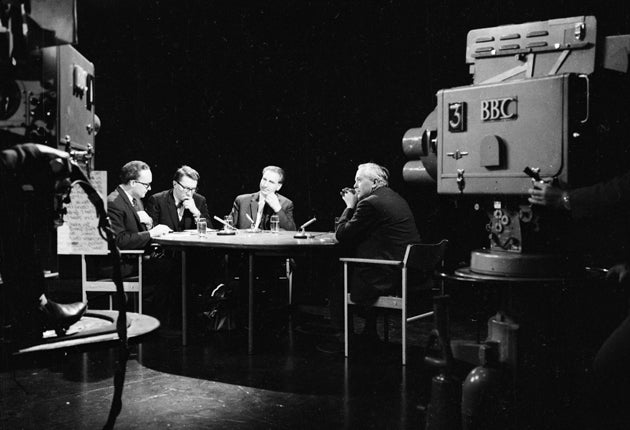How to Win an Election, BBC4<br/>Ask the Chancellors, Channel 4
The camera that set out to discomfort our leaders has become their new best friend

In the early days of Panorama, its host, Richard Dimbleby, described himself without shame as "the perennial layman". And it is in that spirit that this column – written by someone better versed in George Clinton's Parliament than Westminster's – approaches the week in which electioneering began in earnest and British television history was made.
How much the world of politics has changed since the people in power were forced to face the camera was revealed in the BBC documentary How to Win an Election: A Panorama Guide. "In this world of 24-hour news," the opening voice-over boomed as if introducing a disaster movie, "we tend to think that politics and TV were made for each other ... But it wasn't always the case ...."
To illustrate, we were shown Pathé newsreel footage of Piccadilly Circus "crowded as on Victory night", while the election results of the 1950s were beamed on to a hoarding as the crowd below booed and cheered. And though Churchill and many others felt television would downgrade their lofty struggles, what TV actually did was to beam the gulf between those in power and the people directly into our living rooms. It was, much as the internet is today, a great democratiser, and those unwilling to acknowledge its power would pay the price by losing theirs – as first Harold Macmillan and then Alec Douglas-Home would find out.
And so it continued until the 1960s, when politicians could no longer afford to put the soapbox before the gogglebox. Cue Harold Wilson, "the first TV politician in Britain". Ad campaigns, candid holiday footage, the "pipe prop" – even the unflappable Dimbleby was forced to reveal a distaste for Wilson's attempt to "build a brand image". But Wilson also had the ultimate tool: humour. "I saw the Prime Minister on television," he told a crowd, cameras conveniently to hand. "I'm just as much allowed to watch TV as you are. I have my favourite programmes. This wasn't one of them." It was an election-winning performance. Politics would never be the same.
As those battling for power became more sophisticated, so did the methods used to illustrate the issues. Not that there weren't subjects deemed too risky to see the light of Robin Day – the BBC pulling the plug on its film of the 1964 Smethwick by-election, in which the Conservative candidate squeezed home on the slogan "If you want a nigger for a neighbour, vote Labour".
By the late 1970s, politicians had learnt the lessons of the past sufficiently to wrestle back control – a fact tacitly acknowledged by the 1983 Panorama special The Marketing of Margaret. As she silenced her inquisitor with a withering "Mr Day", the leaders of the future could only watch on their own TVs and take notes.
The thing How to Win an Election couldn't go into at this delicate stage was the man currently running the country. Gordon Brown may be many things, but he is nobody's idea of a television politician. Conversely, at a time when TV makes documentaries about TV documentaries, that may still work in his favour, confounding Douglas-Home's 1963 prophecy that "if you aren't careful you'll get a sort of Top of the Pops, with the best actor as leader of the country".
The programme planners didn't see fit to schedule How to Win an Election in a way that would allow viewers to segue from it to Channel 4's Ask the Chancellors. Had they done, it would have cast an eerie glow over a studio set more suited to Anne Robinson than Krishnan Guru-Murthy, a man the people of Smethwick past would not have wanted for their neighbour.
As the first live TV election debate in the history of British politics, Ask the Chancellors can be forgiven for not providing too many TV fireworks. It looked like the party leaders' way to test the water ahead of the first election debate in 11 days' time. Then, Brown, Camera-on and Clegg will battle for the number-one slot on the morning of 7 May. In the meantime, Alistair Darling, Vince Cable and George Osborne looked like men auditioning for a part in a hung parliament.

Watch Apple TV+ free for 7 days
New subscribers only. £8.99/mo. after free trial. Plan auto-renews until cancelled

Watch Apple TV+ free for 7 days
New subscribers only. £8.99/mo. after free trial. Plan auto-renews until cancelled
Times have changed and TV has played its part in that. It doesn't take an expert to see that politics is no longer a clash of ideologies. Cable, not entirely joking, declared the event a "love-in" at one point. As the three men who would be chancellor went to great lengths to spell out ideas, the odd quibble aside, as similar as their suits, Ask the Chancellor exposed no clear winner and, in spite of its set, no weakest link.
Had you watched Ask the Chancellors after How to Win an Election, you would have known that, these days, we tend to think that politics and television are made for each other. Maybe, if the cameras were still the thorn in politicians' side they set out to be, the future might look a little rosier for the rest of us.
Subscribe to Independent Premium to bookmark this article
Want to bookmark your favourite articles and stories to read or reference later? Start your Independent Premium subscription today.

Join our commenting forum
Join thought-provoking conversations, follow other Independent readers and see their replies